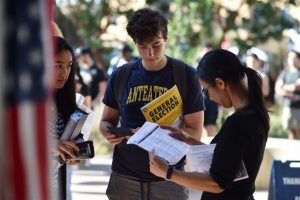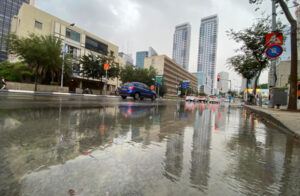My grandfather, Elazar Granot, was the Israeli ambassador in Nelson Mandela’s South Africa between 1994-1996, right after the fall of the apartheid regime. Last August, I visited there myself and witnessed with my own eyes the reality caused by this racist and discriminatory system and its terrible implications for South African society to this day, 25 years after.
“Apartheid” is a loaded and complicated term and has the potential to evoke antagonism. Therefore, and due to its conspicuous absence from mainstream media coverage during the entire time the issue of Israel’s annexation of parts of the West Bank has been high on the agenda, we at Zulat, a human rights think tank, published a report on how Israeli discourse whitewashes the true meaning of the plan.
Our report looks at the shift the notion of annexation has made from the most extreme edges of the messianic right to the political platform of all major parties in Israel – much of it thanks to that discourse laundromat. It reveals the well-orchestrated play by Netanyahu’s right-wing government – supported by most media outlets – designed to hide from the public the fact that annexation anchored in law means turning Israel into an apartheid state.
The fact that we are talking about partial rather than full annexation plays a major role in this. The limited nature of the annexation move doesn’t just help to legitimize it in the eyes of many Israelis; it also allows the State of Israel to have it both ways.
Current annexation plans (and primarily Trump’s plan) carry a great similarity to the apartheid regime in South Africa, not only geographically but mostly in terms of the regime’s nature: The very existence of Bantustans, residential areas designated for the black population, is what ultimately allowed the South African government to avoid giving any rights to the blacks living in their own county, claiming they were citizens of the so-called autonomous areas. That is exactly how partial annexation will allow Israel to have its cake and eat it, too.
The plan is to annex Area C, settlement blocs and the Jordan Valley, leaving the Palestinians with a “state” made up of fragmented and remote enclaves in Areas A and B. This will allow Israel to drop any sense of responsibility it may still have for the millions of Palestinians that it has been occupying and dispossessing for 53 years. At the same time, it will help Israel to both maintain its hold on the entire land it has been dreaming about for generations and ensure that no national entity other than Israel will ever exist between the river and the sea.
Let’s take a Palestinian from Turmus Ayya, a village located in Area B about 20 kilometers north of Ramallah, for instance. Following the implementation of such annexation, what would her everyday life look like?
On one hand, she will continue to suffer from daily deprivation of her most basic human rights by Israel:
Israeli soldiers will continue to enter her home in the middle of the night and “demonstrate their presence” in order to “maintain quiet in the area.” After all, the village now shares a border with the [new] State of Israel.
In the olive harvest season, which was supposed to provide for her family for the entire year, they will not be able to get to their grove in Area C as it has been expropriated from them and annexed to Israel.
Whenever she wants to visit family members living in another village in the West Bank, she will have to pass through a checkpoint of armed soldiers, reminding her that she doesn’t have freedom of movement.
Once in a while her entire village will be put under closure as a collective punishment; all the roads connecting her enclave to others will be kept under Israeli control; and if she ever has to leave her “state” for medical treatment, her fate will still be determined by an Israeli officer.
On the other hand, what kind of living can this Palestinian “state” provide for this Turmus Ayya woman? What would the economy of this non-sovereign enclave state look like? What kind of health, education, social, and medical services could it offer? And what about medical clinics? Social security? Garbage collection? Parking?
If there is anything the coronavirus crisis has taught us all, it is that our well-being is comprised of thousands of tiny elements that make up our daily lives. It is easy to forget how significant each one of them is in shaping our day-to-day routine.
The Palestinian “state” – made up of leftovers of the annexation – will not be able to function as a sovereign body and provide its citizens with the institutions, services, and living conditions that will allow them to live in dignity.
Under such conditions, those enclaves are destined to operate exactly like the Bantustans in South Africa during the apartheid regime: seemingly autonomous and sovereign, but in fact under living conditions, a separation policy, and legal restrictions that will sentence them to extreme poverty and a complete lack of ability to sustain themselves, let alone develop, grow, and become a functioning state.
Annexation will not only perpetuate the ongoing, severe violation and deprivation of Palestinian human rights but will also deepen them and become the founding principle of the Israeli regime. It will literally leave the Palestinians in no man’s land – stuck forever between the State of Israel, which left them with nothing, and a Palestinian “state” that has no ability to take care of its citizens.
July 1st may have passed without any action being taken, but the discourse laundromat continues to work non-stop and set the ground – both literally and figuratively – using terms such as “annexation” and “applying sovereignty” in order to conceal the stain of its apartheid plans.
In the name of my grandfather – who is no longer with us but had the chance to be a politician in Israel at a time when opposing the occupation was still considered good Zionism – and in the name of my future grandkids, I refuse to be a citizen in an apartheid state.
Adi Granot is the annexation project manager at Zulat, an activist think tank focusing on equality and human rights. She is a singer-songwriter who focuses on the relationship between music and politics and holds a master’s degree in political communications from LSE.




